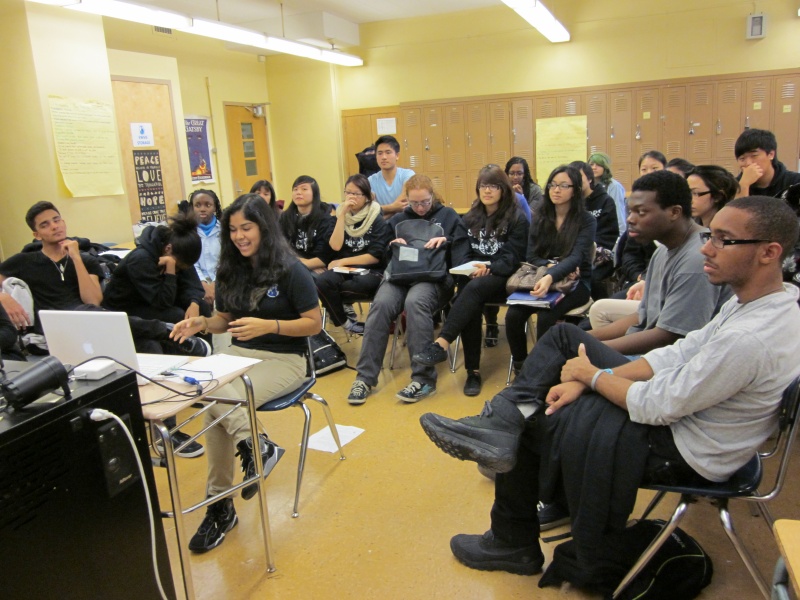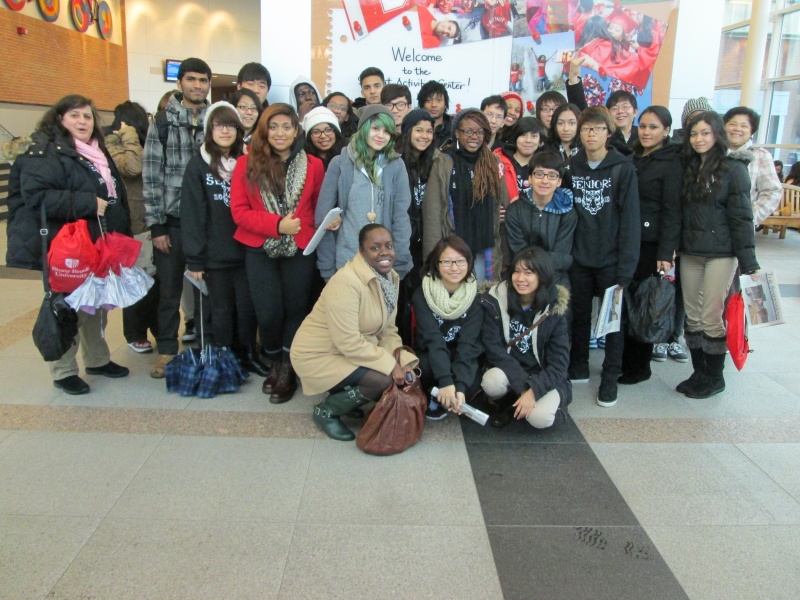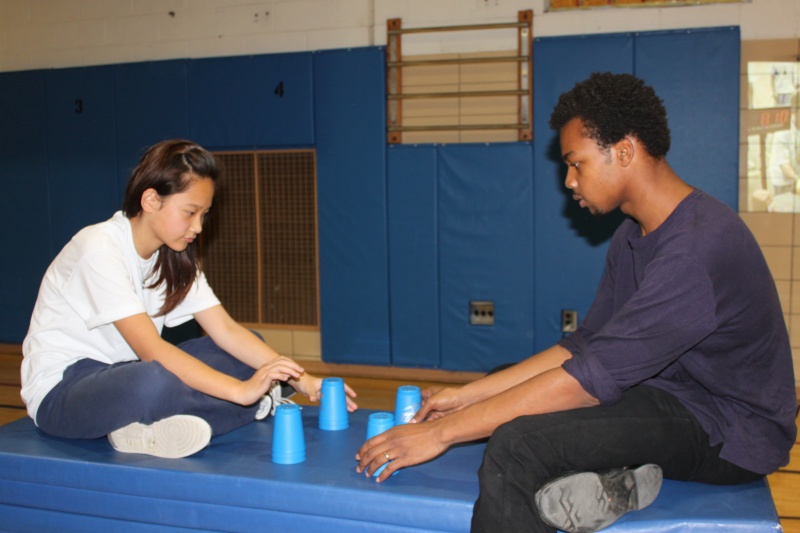East-West Students visit US Ambassador Gary Locke
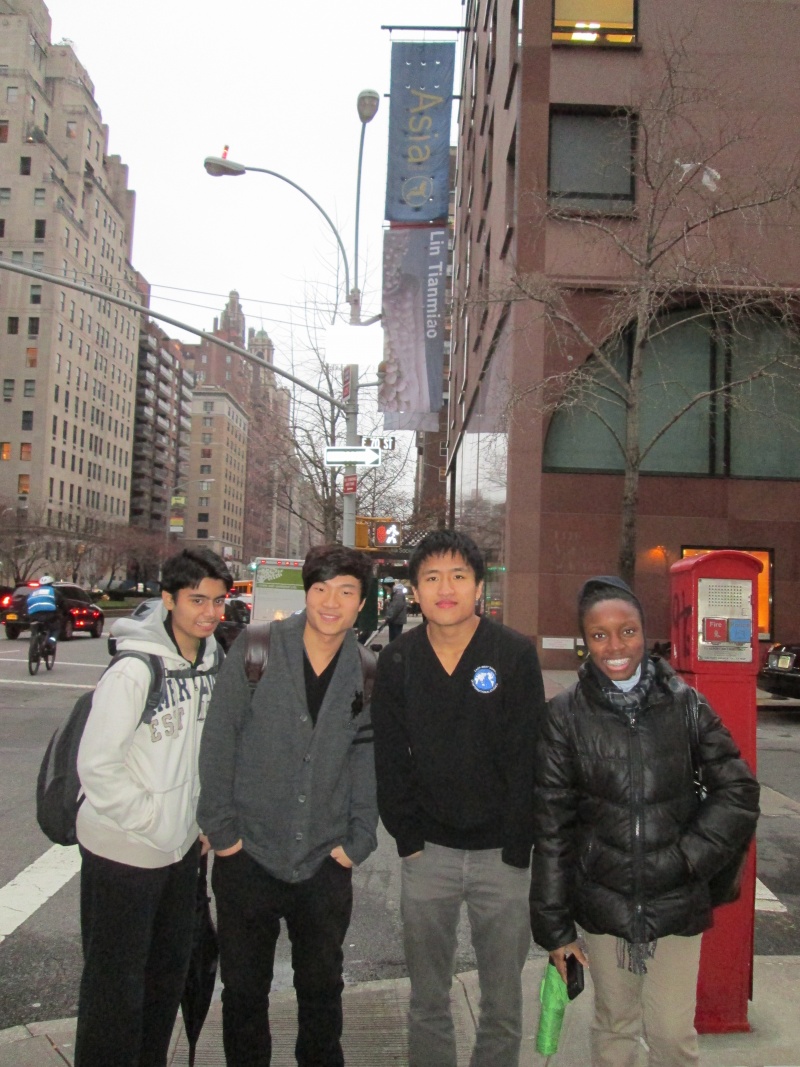
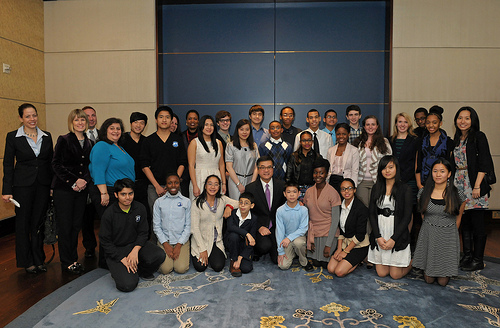 East-West Students and Mrs. Katz at Asia Society with US Ambassador, Gary Locke
East-West Students and Mrs. Katz at Asia Society with US Ambassador, Gary Locke
As a member of the Hanban-Asia Society Confucius Classroom Network, four East-West students were invited to Asia Society and Museum for a question and answer session with US Ambassador to China, Gary Locke.
Mrs. Katz writes:
On Monday afternoon, I was fortunate to chaperone 4 East-West students (Moheeb Ahmed, Sequoya Fahie, Yi Yan and Jiaming Lin) to a student question and answer session with Gary Locke, the US Ambassador to China. Ambassador Locke has served as Governor of Washington State, US Secretary of Commerce and in other public offices. East-West was among 7 other schools invited, all of whom have Confucius Classrooms like we do.Moheeb Ahmed, Jiaming Lin, Yi Yan and Sequoya Fahie
We sent in three questions and we were selected to ask the Ambassador one. Sequoya asked: What can the US and China do to help solve the world's problems. He responded that we work together on issues such as climate change, we support each other in military ventures and diplomatic causes. He seemed to enjoy speaking with the students and asked if there were more questions later. Moheeb asked about the difference between our rights as Americans and rights of the Chinese people. Ambassador Locke discussed freedom of expression and human rights. He said how lucky we were, and how it is hopeful that China will move in that direction. In answering another question, he stressed the importance of an education filled with reading, writing, math and overall critical thinking. He also spoke about his pride at being the first Asian-American governor, Secretary of Commerce and more.US Ambassador Gary Locke
After a few questions from other schools, we took a group picture that I hope to be able to share soon. He was an excellent speaker and related well to the students.East-West Students participate in Q&A session
After this, we were able to watch a webcast of George Stephanopoulous interviewing the Ambassador. It was very interesting. They served us a pizza dinner, and then we headed back home.ABC's Chief Political Correspondent, George Stephanopoulos, interviewing US Ambassador, Gary Locke
I think that the idea that our kids got to be part of this conversation. It helps them to understand the importance of global relationships and the global economy.Thank you once again to Ms. Chang for writing the grant that allows us to have a Confucius classroom and have the opportunity for trips to China and experiences like today. Thank you to Mr. Sherman for making this all possible.Click here to view more photos from this event.
Dear Asia Society Confucius Classrooms/ISSN in New York City:
We were pleased by the great turnout at this week's special event with Ambassador Gary Locke. Thank you for putting together such a terrific group of students to represent your schools and the International Studies Schools and Confucius Classrooms networks – especially on such short notice. We hope you will agree it was a substantive event. The time the Ambassador spent with the students was a bit longer than we expected, so we were happy he could take even more questions from the students than we'd prepared for. Again, we appreciate your patience with the unexpected, cantankerous technology we experienced in the latter part of the program. We're very sorry that the connection proved to be so poor, likely due to the volume of folks also watching the live stream around the world.
We would love to hear feedback from you and the students in particular. If you and/or your students have a few moments to let us know what you thought of the interaction with the Ambassador and what he had to say, or any other comments about the event, we would very much welcome them!
Attached is the professional group photograph, and we've collected the rest of the images on Flickr. It's a private photo set, so you'll have to access it with this guest pass: http://flickr.com/gp/55778069@N05/36Hc7A
From this Flickr set, you may download any photo as follows:
- Click on the thumbnail photo you'd like to view and download.
- From the pull-down "Actions" menu at the upper left-hand corner of the photo, select "View all sizes."
- Select the size you'd like to download, then click on "Download the XX size of this photo.
You might also like to read the post which our Vice President of Education, Tony Jackson, wrote for his EdWeek blog, reflecting on the event: http://blogs.edweek.org/edweek/global_learning/2012/12/advice_from_an_ambassador_do_this_and_be_set_for_life.html
Enjoy, and we look forward to hearing from you!
Best regards and happy holidays,
Asia Society EducationAdvice From an Ambassador: Do This and Be Set for Life
By Anthony Jackson on December 19, 2012 4:16 AMYesterday I watched as New York City teens talked about pirates.
They weren't talking about Robinson Crusoe in class. Nor was their conversation about the Pittsburgh Pirates, and it certainly wasn't about Captain Jack Sparrow.
They were talking about very real pirates off the Eastern coast of Africa. And they were talking about it with the Honorable Gary Locke, U.S. Ambassador to China.
The students came from seven secondary schools throughout the city that have an international studies focus, and they were all Chinese language learners. Their questions came as easily as their comfort in hanging out with a United States Ambassador.
Sequoya Fahie asked about bilateral relations solving common problems.
"We're not going to be able to solve many of the world's problems unless China and the United States are working together," the diplomat explained. There are many international security issues that the United States and China work on together: the war in Afghanistan, non-proliferation of nuclear weapons in North Korea, and water security issues related to global warming.
The discourse about international affairs was important to the students, but perhaps more so was how they can make a difference in the world.
Isaac Guerrero asked about career pathways into a life of civic service, like the one Locke has chosen. Locke started out in law, and then went into local government. His advice to the students, however, didn't mirror his own experience.
"[In the 21st century], learn about history. Learn about culture. And language," he advised. "If you can speak Chinese or Spanish, you are practically guaranteed a job in your chosen field."
Ambassador Locke said that people of his father's generation often stayed in one job throughout their working lives. "The thing to understand," he told the students, "is that you have many possibilities throughout your life."
Beyond diplomacy, he encouraged students to follow their many passions, whether law or writing, dance or running a business. The key? "Get a good education."
"It's not so important to memorize things as it is to be able to analyze things," Locke said. He encouraged students to pursue deeper learning: ask questions, have an informed opinion, and be able to defend their positions. While he encouraged them to be strong in the humanities and sciences, he stressed that their ability to think critically would set them apart.
Hearing the many questions the students posed to Ambassador Locke—from heritage and identity issues to international relations—it's clear to me that these students are getting exactly the kind of education Locke urges them to pursue. They are able to raise good questions and express themselves clearly, and they are confident in their quest to learn more about the complex world around them.
In this interconnected world, every student should have this type of education. As Ambassador Locke said, with it, "you'll be set for life."
The students represented the College of Staten Island High School for International Studies; the East-West School of International Studies; Medgar Evers College Preparatory School; Edward Bleeker Junior High School; Global Learning Collaborative; Henry Street School for International Studies; and the Little Red School House & Elisabeth Irwin High School. They are all part of Asia Society's International Studies Schools Network or the Confucius Classrooms Network.














